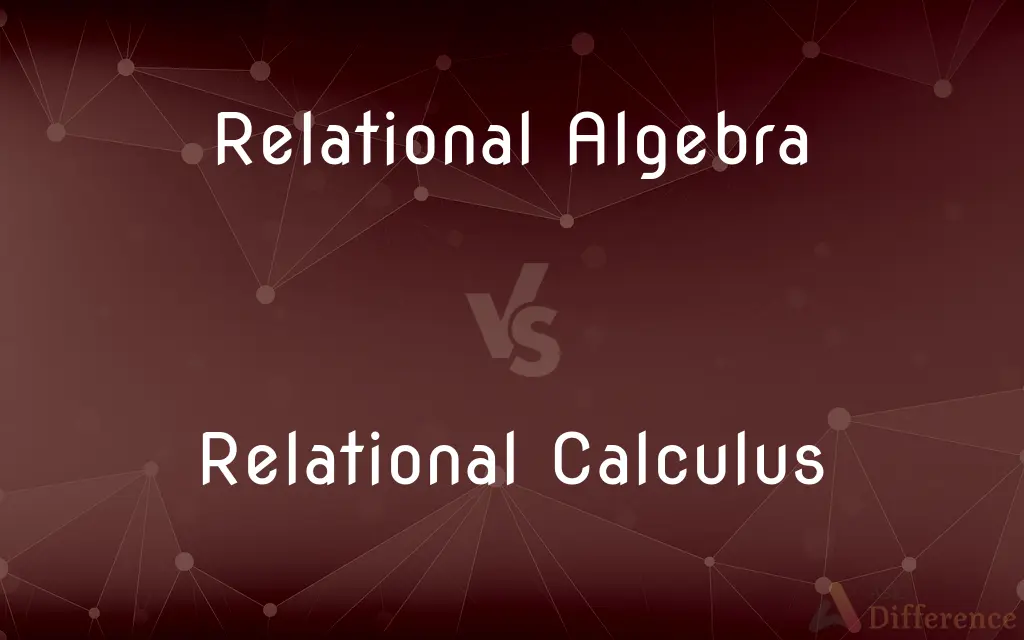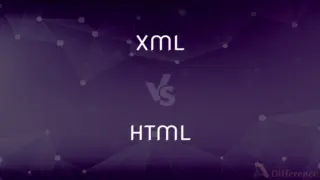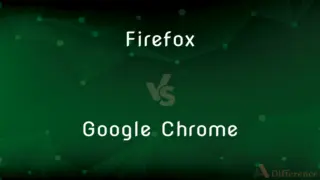Relational Algebra vs. Relational Calculus — What's the Difference?
By Tayyaba Rehman — Published on January 12, 2024
Relational Algebra is a procedural query language using operators, while Relational Calculus is a non-procedural query language based on predicate logic.

Difference Between Relational Algebra and Relational Calculus
Table of Contents
ADVERTISEMENT
Key Differences
Relational Algebra is a procedural language that describes how to obtain the result of a query. It utilizes operators like join, select, and project to manipulate data sets. Relational Calculus, on the other hand, is a non-procedural language. It focuses on what to retrieve rather than how to retrieve it, using logical predicates to express queries.
In Relational Algebra, queries are constructed using a set of operations that take one or two relations as input and produce a new relation as output. It’s akin to assembling a machine to process data. Relational Calculus, conversely, formulates queries as expressions, representing the desired properties of the data to be retrieved, akin to describing the desired outcome.
Relational Algebra’s approach is more operational, focusing on describing a sequence of operations to perform on the database. This operational aspect makes it closer to the actual computation process. Relational Calculus, in contrast, is more declarative, specifying what results are desired without explicitly stating the operations to achieve those results.
The operators in Relational Algebra include select, project, union, set difference, Cartesian product, and rename. Each operator plays a specific role in manipulating data sets. Relational Calculus, however, uses a single, powerful expression to articulate complex queries, relying on a logical framework of predicates and quantifiers.
Relational Algebra is often considered more intuitive for those with a programming background due to its procedural nature. Relational Calculus, with its logical, declarative nature, might be more approachable for those with a background in mathematical logic or theoretical computing.
ADVERTISEMENT
Comparison Chart
Nature
Procedural
Non-procedural
Query Formulation
Describes how to obtain the result
Specifies what results to obtain
Operations/Expressions
Uses specific operators (e.g., select, join, project)
Uses logical predicates
Approach
Operational, step-by-step
Declarative, outcome-focused
Suitability
Intuitive for those with programming experience
Accessible for those with a background in mathematical logic
Compare with Definitions
Relational Algebra
Relational Algebra manipulates and retrieves data from relations.
A project operation in Relational Algebra retrieves specific columns from a database table.
Relational Calculus
It is based on predicate logic.
Relational Calculus can formulate a query using existential quantifiers to find specific data sets.
Relational Algebra
Relational Algebra is a formal system for manipulating relations.
Cartesian product in Relational Algebra combines every row of one relation with every row of another.
Relational Calculus
Relational Calculus focuses on what to retrieve rather than how to retrieve.
A query in Relational Calculus might ask for employees in a department without specifying how to join tables.
Relational Algebra
Relational Algebra is a procedural query language for relational databases.
Using Relational Algebra, the join operation combines two tables based on a common attribute.
Relational Calculus
Relational Calculus provides a foundation for theoretical aspects of databases.
Using Relational Calculus, one can express complex queries like finding all pairs of customers who live in the same city.
Relational Algebra
It forms the theoretical basis of relational databases.
Relational Algebra's union operator merges two datasets with common attributes.
Relational Calculus
It uses logical predicates to describe queries.
Relational Calculus allows expressing a query to find all students with grades above a certain threshold.
Relational Algebra
It uses operators to perform queries.
The select operator in Relational Algebra filters records meeting specific criteria.
Relational Calculus
Relational Calculus is a non-procedural query language for relational databases.
In Relational Calculus, a query might specify the retrieval of all records where a certain condition is true.
Common Curiosities
How does Relational Calculus differ from Relational Algebra?
Relational Calculus is non-procedural and uses logical predicates for queries, focusing on the 'what' rather than the 'how'.
Can you give an example of a Relational Algebra operation?
Yes, a common operation is 'select', which filters data based on a criterion.
What is Relational Algebra?
Relational Algebra is a procedural language used for querying relational databases, using specific operators to manipulate data.
What kind of language is Relational Calculus?
Relational Calculus is a declarative language based on predicate logic.
Can Relational Algebra perform complex queries?
Yes, but it may require a combination of several operations.
Do Relational Algebra and Calculus require different skill sets?
Yes, Algebra is more operational, while Calculus is more logical and theoretical.
Are Relational Algebra and Calculus still relevant?
Yes, they form the theoretical foundation for many database query languages.
Is Relational Algebra easy to understand for programmers?
Yes, its procedural nature is often more intuitive for those with programming experience.
What is a typical use of Relational Calculus?
It's used to express complex database queries in a declarative manner.
Can Relational Calculus operations be automatically converted to Relational Algebra?
In many cases, yes, as they are theoretically interconvertible.
Are there any modern languages based on Relational Calculus?
SQL, the standard database language, is influenced by concepts from Relational Calculus.
What's a key advantage of Relational Algebra?
Its procedural nature makes it straightforward for constructing step-by-step query processes.
Is Relational Calculus more abstract than Relational Algebra?
Yes, it's more focused on the logic of what data should be retrieved.
Is knowledge of Relational Algebra necessary for database design?
Understanding it is beneficial, as it underpins many database operations.
Do all database systems support Relational Algebra and Calculus?
Most relational database systems are based on these concepts, though not always explicitly.
Share Your Discovery

Previous Comparison
XML vs. HTML
Next Comparison
Firefox vs. Google ChromeAuthor Spotlight
Written by
Tayyaba RehmanTayyaba Rehman is a distinguished writer, currently serving as a primary contributor to askdifference.com. As a researcher in semantics and etymology, Tayyaba's passion for the complexity of languages and their distinctions has found a perfect home on the platform. Tayyaba delves into the intricacies of language, distinguishing between commonly confused words and phrases, thereby providing clarity for readers worldwide.













































